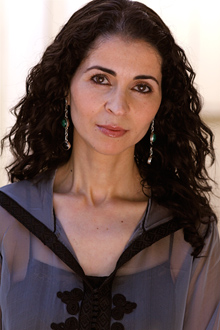UPDATE 3/21/11: The winners have been announced.
UPDATE 3/13/11: List of finalists.
UPDATE 3/12/11: List of semifinalists.
UPDATE 3/4/11: See full list of nominees: Voting round is now open.
Dear Readers, Writers, Bloggers,
 We are very honored and pleased to announce that Laila Lalami has agreed to be the final judge for our second annual prize for the best writing in a blog or e-zine in the category of Arts & Literature. (Details of last year's A&L prize, judged by Robert Pinsky, can be found here.) Laila Lalami was born and raised in Morocco. She attended Université Mohammed-V in Rabat, University College in London, and the University of Southern California, where she earned a Ph.D. in linguistics. Her essays have appeared in the Boston Globe, the Los Angeles Times, The Nation, the New York Times, the Washington Post and elsewhere. She is the recipient of a British Council Fellowship and a Fulbright Fellowship. She was short-listed for the Caine Prize for African Writing in 2006 and for the National Book Critics’ Circle Nona Balakian Award in 2009. She is the author of the short story collection Hope and Other Dangerous Pursuits and the novel Secret Son. Her work has been translated into ten languages. She is currently Associate Professor of Creative Writing at the University of California at Riverside. Dr. Lalami has also been responding to the recent upheavals in Arab countries, and you may see some of that work here. Her well-known blog is here, and you may also follow her on Twitter here.
We are very honored and pleased to announce that Laila Lalami has agreed to be the final judge for our second annual prize for the best writing in a blog or e-zine in the category of Arts & Literature. (Details of last year's A&L prize, judged by Robert Pinsky, can be found here.) Laila Lalami was born and raised in Morocco. She attended Université Mohammed-V in Rabat, University College in London, and the University of Southern California, where she earned a Ph.D. in linguistics. Her essays have appeared in the Boston Globe, the Los Angeles Times, The Nation, the New York Times, the Washington Post and elsewhere. She is the recipient of a British Council Fellowship and a Fulbright Fellowship. She was short-listed for the Caine Prize for African Writing in 2006 and for the National Book Critics’ Circle Nona Balakian Award in 2009. She is the author of the short story collection Hope and Other Dangerous Pursuits and the novel Secret Son. Her work has been translated into ten languages. She is currently Associate Professor of Creative Writing at the University of California at Riverside. Dr. Lalami has also been responding to the recent upheavals in Arab countries, and you may see some of that work here. Her well-known blog is here, and you may also follow her on Twitter here.
As usual, this is the way it will work: the nominating period is now open, and will end at 11:59 pm New York City Time (EST) on March 2, 2011. There will then be a round of voting by our readers which will narrow down the entries to the top twenty semi-finalists. After this, we will take these top twenty voted-for nominees, and the four main editors of 3 Quarks Daily (Abbas Raza, Robin Varghese, Morgan Meis, and Azra Raza) will select six finalists from these, plus they may also add up to three wildcard entries of their own choosing. The three winners will be chosen from these by Dr. Lalami.
The first place award, called the “Top Quark,” will include a cash prize of one thousand dollars; the second place prize, the “Strange Quark,” will include a cash prize of three hundred dollars; and the third place winner will get the honor of winning the “Charm Quark,” along with a two hundred dollar prize.
(Welcome to those coming here for the first time. Learn more about who we are and what we do here, and do check out the full site here. Bookmark us and come back regularly, or sign up for the RSS feed.)
 Details (please read carefully before nominating):
Details (please read carefully before nominating):
The winners of this Arts & Literature Prize will be announced on March 21, 2011. Here's the schedule:
February 23, 2011:
- The nominations are opened. Please nominate your favorite blog entry or e-zine piece by placing the URL for the blog post (the permalink) in the comments section of this post. You may also add a brief comment describing the entry and saying why you think it should win. (Do NOT nominate a whole blog, just one individual blog post.)
- Blog posts or e-zine articles longer than 4,000 words are not eligible.
- Each person can only nominate one blog post.
- We will accept poems and fiction, as well as book or art reviews, criticism, and other types of writing about arts or literature.
- Entries must be in English.
- The editors of 3QD reserve the right to reject entries that we feel are not appropriate.
- The blog entry may not be more than a year old. In other words, it must have been written after February 22, 2010.
- You may also nominate your own entry from your own or a group blog or e-zine (and we encourage you to).
- Guest columnists at 3 Quarks Daily are also eligible to be nominated, and may also nominate themselves if they wish.
- Nominations are limited to the first 200 entries.
- Prize money must be claimed within a month of the announcement of winners.
March 2, 2011
- The nominating process will end at 11:59 PM (NYC time) of this date.
- The public voting will be opened soon afterwards.
March 11, 2011
- Public voting ends at 11:59 PM (NYC time).
March 21, 2011
- The winners are announced.
One Final and Important Request
If you have a blog or website, please help us spread the word about our prizes by linking to this post. Otherwise, post a link on your Facebook profile, Tweet it, or just email your friends and tell them about it! I really look forward to reading some very good material, and think this should be a lot of fun for all of us.
Best of luck and thanks for your attention!
Yours,
Abbas
A little over a month ago I asked Mahmood Mamdani if he’d be willing to have a conversation about Ugandan politics in advance of the presidential elections here. Often described as the intellectual heir of Edward Said, Mamdani has attracted praise, scorn, and much international attention for his richly detailed and often stridently contrarian analyses of contemporary African events. He is the author, most recently, of Saviors and Survivors, a critical and controversial analysis of the Save Darfur Coalition.
